|
|
|
Sort Order |
|
|
|
Items / Page
|
|
|
|
|
|
|
| Srl | Item |
| 1 |
ID:
103372
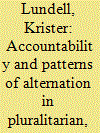

|
|
|
|
|
| Publication |
2011.
|
| Summary/Abstract |
One of the core values in a democracy is the possibility for citizens to bring about alternation in power if they disapprove of the governmental policy. This article examines patterns of alternation and the degree of accountability in three different democratic systems: pluralitarian (characterized by a two-party system), majoritarian (moderately fragmented party system) and consensus (very fragmented party system) democracies. The extent of non-alternation as well as wholesale alternation decreases as we move from pluralitarian to majoritarian and further on to consensus democracy. When alternation is related to election results, majoritarian systems are the most responsive ones, whereas consensus systems generate the lowest degree of accountability.
|
|
|
|
|
|
|
|
|
|
|
|
|
|
|
|
| 2 |
ID:
161661
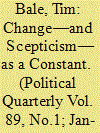

|
|
|
|
|
| Summary/Abstract |
Tony King had a healthy disrespect for conventional wisdom but a deep appreciation for common sense. Drawing on an eclectic mix of sources, both qualitative and quantitative, he wore his learning lightly, the better to highlight and explain to academic and non‐academic audiences how shifts in society and public opinion drove change inside parties and in the party systems in which they operated. King asked great questions and provided answers that simultaneously captured complexity and the big picture. His provocative interpretations and analysis were always stimulating—and many of them proved highly prescient.
|
|
|
|
|
|
|
|
|
|
|
|
|
|
|
|
| 3 |
ID:
105709
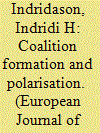

|
|
|
|
|
| Publication |
2011.
|
| Summary/Abstract |
Party ideology plays an important role in determining which government coalitions form. Research on coalition formation tends to focus on the ideological distance between coalition parties. However, the distribution of preferences within the coalition, and the legislature, also has implications for which government coalition forms - that is, a party's willingness to join a coalition depends not only on its prospective coalition partners, but also on the alternative coalitions it could form. Several hypotheses about the effects of legislative polarisation are offered and tested using data on coalition formation in 17 parliamentary democracies in the postwar period. This article also demonstrates how the traditional measure of ideological divisions within coalitions fails to capture certain aspects of ideological heterogeneity within the cabinet (and the opposition) and how Esteban and Ray's polarisation index helps in addressing these deficiencies.
|
|
|
|
|
|
|
|
|
|
|
|
|
|
|
|
| 4 |
ID:
119935
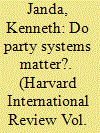

|
|
|
| 5 |
ID:
148782
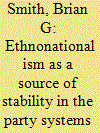

|
|
|
|
|
| Summary/Abstract |
Democratization, economic transformation, and EU accession have shaped the Bulgarian and Romanian party systems in ways similar to that seen across the rest of eastern Europe. A quarter century after democratization, the party systems remain unstable. The article demonstrates that nationalism and ethnic identity provide stable voter salience in party systems that remain dominated by fragmentation, personalistic political parties, and a lack of issue differentiation. An analysis of the use of ethnonationalism by political elites in Bulgaria is contrasted with a briefer analysis of Romania.
|
|
|
|
|
|
|
|
|
|
|
|
|
|
|
|
| 6 |
ID:
152447


|
|
|
|
|
| Summary/Abstract |
This article offers an analysis of the level of post-1980 Turkish party system institutionalization (PSI) and party system type. Although Turkey shares characteristics with both established and new democracies, no research has compared Turkey to both the established and new democracies with regard to PSI. Utilizing Croissant and Völkel’s four-dimensional index of PSI and Siaroff’s typology of party system type, this article shows that the level of Turkish PSI is higher than that of new democracies. The Turkish party system has not been fully institutionalized yet; however, the dominant party system introduces a certain degree of stability and predictability.
|
|
|
|
|
|
|
|
|
|
|
|
|
|
|
|
| 7 |
ID:
173332
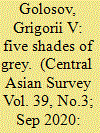

|
|
|
|
|
| Summary/Abstract |
This article overviews and seeks to explain the processes of party system formation in the post-Soviet Central Asian states (Kazakhstan, Kyrgyzstan, Tajikistan, Turkmenistan and Uzbekistan) by focusing on a crucial party-system property, fragmentation. The analysis reveals that to a much greater extent than in democracies, where party systems are largely shaped by societal factors, the level of party system fragmentation in autocracies is determined by the scope of presidential powers, as entrenched in the formal institutional order and reflected in the national constitution. The level of authoritarianism is largely inconsequential for party system fragmentation, while the role of electoral rules is secondary. Institutionally weak and institutionally strong autocratic presidents have a preference for fragmented party systems, while presidents with an intermediate range of powers seek and obtain low levels of party system fragmentation.
|
|
|
|
|
|
|
|
|
|
|
|
|
|
|
|
| 8 |
ID:
131063
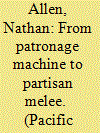

|
|
|
|
|
| Publication |
2014.
|
| Summary/Abstract |
The party system in Indonesia has expanded in the post-Suharto era. With each successive election, voters have spread their support across a wider array of parties. This has occurred despite deliberate institutional tweaks designed to consolidate the system by privileging large parties. Why has the party system expanded despite increasing institutional incentives to consolidate? This article places party system change in a broader context of decentralization and corruption. The decentralization and deconcentration of political power has opened multiple avenues for voters and elites to access state resources. Whereas major parties were expected to dominate resources in the immediate aftermath of the transition, changes to the formal and informal institutions eroded their control over the state. This has caused previously consolidated subnational party systems to fracture. The argument is demonstrated using narrative and newly constructed cross-district datasets. The paper develops the concept of rent opportunities, defined as the ability to access and abuse state resources. Party system expansion has been greatest in areas with high rent opportunities, where both voters and elites are Social Media Presidential Election Indonesia 2014 Indonesiaparticularly motivated by the competition for state resources. In these areas, characterized by large state sectors, the formerly authoritarian party (Golkar) initially won large electoral victories due, in part, to its control over patronage. As Golkar lost its ability to monopolize resources, the party system fractured. Voting for small parties surged and the party machine was replaced by a partisan melee. My argument exposes the limits of institutional engineering and underlines the formative role corruption has had on the evolution of Indonesia's party system.
|
|
|
|
|
|
|
|
|
|
|
|
|
|
|
|
| 9 |
ID:
188331
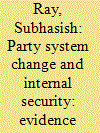

|
|
|
|
|
| Summary/Abstract |
Has the consolidation of the Hindu nationalist Bharatiya Janata Party (BJP) as the dominant party at the national level since the 2014 Lok Sabha election affected internal security outcomes in India? This question assumes particular significance because of the primacy accorded to the use of force in the BJP’s counter-insurgency (COIN) strategy. Using sub-national data on insurgency-related fatalities from 2005–2021, I examine whether states where the BJP received the largest share of votes in the 2014 Lok Sabha election subsequently experienced any significant changes in the pattern of fatalities. Implementing a difference-in-difference econometric specification, I show that the BJP states experienced a relatively sharper decline in security force fatalities from pre-2014 compared to non-BJP states. However, there was no such effect on civilian fatalities or the total number of insurgency-related incidents. Taken together, these findings show that the greater thrust towards militarism in COIN strategy under the BJP, has, paradoxically, increased the security of military/police personnel involved in COIN operations, without commensurate changes in the security of those whom they are mandated to defend.
|
|
|
|
|
|
|
|
|
|
|
|
|
|
|
|
| 10 |
ID:
178072
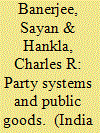

|
|
|
|
|
| Summary/Abstract |
We argue that two key party system characteristics – the effective number of parties and electoral volatility – have a curvilinear, inverted-U shaped, influence on public goods provision. Rejecting the linear pattern generally assumed in the literature, we contend that optimal governance outcomes will be observed at intermediate levels of party system size and stability. Only under these conditions will the benefits of competition be balanced against the risks of fragmentation. We find support for our arguments by employing new data and estimating panel models of public goods provision in 29 Indian states and territories. We hope that our findings will contribute to understanding how party systems function, particularly those at the subnational level, and will better inform how they can be leveraged for development and good governance. We also hope that they will provide some guidance about the future trajectory of public policy in the Indian states.
|
|
|
|
|
|
|
|
|
|
|
|
|
|
|
|
| 11 |
ID:
113873
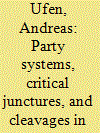

|
|
|
|
|
| Publication |
2012.
|
| Summary/Abstract |
This article differentiates between clientelist (Thailand and the Philippines) and cleavage-based parties and party systems (Malaysia and Indonesia) with reference to insights of historical institutionalism. Clientelist parties, in contrast to cleavage-based ones, often undermine democratization because, on average, representativeness is weak, bureaucracy is more politicized, and rent-seeking behavior is widespread.
|
|
|
|
|
|
|
|
|
|
|
|
|
|
|
|
| 12 |
ID:
128941
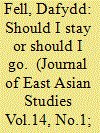

|
|
|
|
|
| Publication |
2014.
|
| Summary/Abstract |
Patterns of party switching in Taiwan have played an important role in the development and relative stability of its party system. In this study I aim to track key patterns of how politicians switched their partisan affiliation during the critical periods of party system change. I examine the level of party switching, where party switching was most prevalent, when switching was most common, and the most common types of switching since the advent of multiparty politics in Taiwan. Party switching is an important phenomenon in the development of party politics in Taiwan but thus far it has received surprisingly little systematic attention. This is the first comprehensive attempt to tackle this understudied topic.
|
|
|
|
|
|
|
|
|
|
|
|
|
|
|
|
| 13 |
ID:
074777
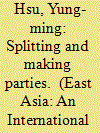

|
|
|
|
|
| Publication |
2006.
|
| Summary/Abstract |
The development of Taiwanese party politics reached a milestone in the 2000 presidential and 2001 legislative elections. The island's pre-existing three-party system underwent a marked reconfiguration. With the split of the Kuomintang (KMT), two new parties emerged but one existing party nearly collapsed. Party politics in Taiwan have shown a continuous process of proliferation of new parties. This paper analyzes the underlying logic that drives the reconfiguration of the Taiwanese party system. A political-institution perspective is employed to show how social cleavages, mixed electoral incentives, and government formation work in dictating the transformation of the party system.
|
|
|
|
|
|
|
|
|
|
|
|
|
|
|
|
| 14 |
ID:
097363
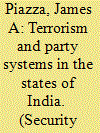

|
|
|
|
|
| Publication |
2010.
|
| Summary/Abstract |
The incidence of domestic terrorism varies dramatically across the states of India. This study demonstrates that important state-level differences in political party systems help to explain different levels of terrorist activity within the Indian states. Analysis of statistical data on terrorist attacks as well as other political, social, and macroeconomic indicators of the twenty-seven Indian states and the Delhi municipality from 1998 to 2006, determines that Indian states characterized by multiparty electoral competition, a diffusion of legislative seat distribution among parties, and minority party government are more likely to experience terrorist attacks than states with stable, two-party systems and majority party rule. These party system features increase the likelihood that terrorism will occur because they nurture the political conditions under which terrorism is likely to flourish and because they impair government ability to craft coherent and effective responses to terrorism.
|
|
|
|
|
|
|
|
|
|
|
|
|
|
|
|
|
|
|
|
|